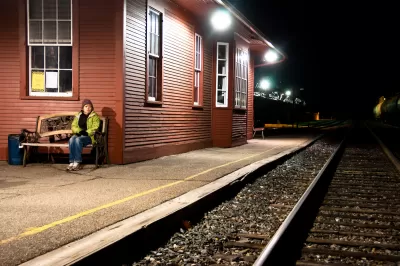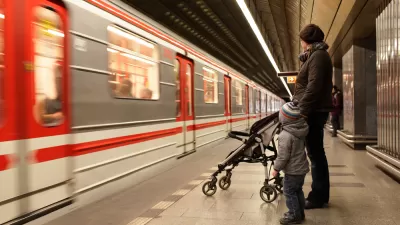People of different genders, ages, and abilities experience transportation differently. But policies aren’t designed that way.

Writing in Streetsblog USA, Sara Ortiz Escalante argues that “road safety is gendered,” and that the dominant transportation planning paradigm fails to serve most demographics, often directly putting them at higher risk.
Women, men, and people with other gender identities have different mobility patterns. But transportation policies have been designed prioritizing androcentric, ethnocentric, and classist mobility systems, responding to the needs of a single model of a person: a white, able-bodied, middle-class adult male with a paid job who drives each morning from a residential suburb into the central business district and home each night.
For Ortiz Escalante, “mobility policies that prioritize men’s movement have built social and gender inequalities into our very streets.” Ortiz Escalante calls for viewing “Mobility from a feminist perspective.” The article recommends expanding the concept of safety to fully include and understand the needs of all types of road and transit users such as women, people with disabilities, and children.
For example, “women move mostly on foot or by public transport, increasing their exposure to traffic crashes. They are more likely to make several stops in one journey to shop for groceries, pick up or drop off dependents, and run other errands, and are more likely to travel with minors or dependents due to their socially imposed role as caregivers.”
As other researchers have pointed out, designing roads and transportation policies to be more inclusive, known as universal design, can benefit all groups.
FULL STORY: Mobility Safety from a Feminist Perspective

Alabama: Trump Terminates Settlements for Black Communities Harmed By Raw Sewage
Trump deemed the landmark civil rights agreement “illegal DEI and environmental justice policy.”

Study: Maui’s Plan to Convert Vacation Rentals to Long-Term Housing Could Cause Nearly $1 Billion Economic Loss
The plan would reduce visitor accommodation by 25% resulting in 1,900 jobs lost.

Planetizen Federal Action Tracker
A weekly monitor of how Trump’s orders and actions are impacting planners and planning in America.

Waymo Gets Permission to Map SF’s Market Street
If allowed to operate on the traffic-restricted street, Waymo’s autonomous taxis would have a leg up over ride-hailing competitors — and counter the city’s efforts to grow bike and pedestrian on the thoroughfare.

Parklet Symposium Highlights the Success of Shared Spaces
Parklets got a boost during the Covid-19 pandemic, when the concept was translated to outdoor dining programs that offered restaurants a lifeline during the shutdown.

Federal Homelessness Agency Places Entire Staff on Leave
The U.S. Interagency Council on Homelessness is the only federal agency dedicated to preventing and ending homelessness.
Urban Design for Planners 1: Software Tools
This six-course series explores essential urban design concepts using open source software and equips planners with the tools they need to participate fully in the urban design process.
Planning for Universal Design
Learn the tools for implementing Universal Design in planning regulations.
Caltrans
Smith Gee Studio
Institute for Housing and Urban Development Studies (IHS)
City of Grandview
Harvard GSD Executive Education
Toledo-Lucas County Plan Commissions
Salt Lake City
NYU Wagner Graduate School of Public Service





























